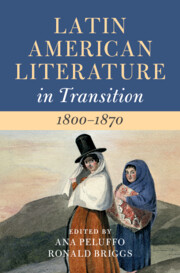Book contents
- Latin American Literature in Transition 1800–1870
- Latin American Literature in Transition
- Latin American Literature in Transition 1800–1870
- Copyright page
- Contents
- Figures
- Contributors
- Acknowledgments
- Introduction
- Part I Aesthetics of Disorder
- Part II Affective Communities
- Chapter 8 Imagining Popular Sovereignty
- Chapter 9 The Arithmetic of Sentiment
- Chapter 10 Costumbrismo As Political Ethnography
- Chapter 11 The Disruptive Andean
- Chapter 12 The Material and Cultural Politics of Publishing
- Chapter 13 Hygiene, Good Manners, and the Public Body
- Chapter 14 Intimacy, Identity, and the Nation
- Part III Intersectional Subjectivities
- Part IV Transoceanic Consciousness
- Index
- References
Chapter 8 - Imagining Popular Sovereignty
from Part II - Affective Communities
Published online by Cambridge University Press: 24 January 2023
- Latin American Literature in Transition 1800–1870
- Latin American Literature in Transition
- Latin American Literature in Transition 1800–1870
- Copyright page
- Contents
- Figures
- Contributors
- Acknowledgments
- Introduction
- Part I Aesthetics of Disorder
- Part II Affective Communities
- Chapter 8 Imagining Popular Sovereignty
- Chapter 9 The Arithmetic of Sentiment
- Chapter 10 Costumbrismo As Political Ethnography
- Chapter 11 The Disruptive Andean
- Chapter 12 The Material and Cultural Politics of Publishing
- Chapter 13 Hygiene, Good Manners, and the Public Body
- Chapter 14 Intimacy, Identity, and the Nation
- Part III Intersectional Subjectivities
- Part IV Transoceanic Consciousness
- Index
- References
Summary
Article 39 of the Mexican Constitution of 1857 or Leyes de Reforma, enacted by Mexican liberals in the midst of decades of strife and foreign intervention, remains one of the key political texts in the country’s history: “La soberanía nacional reside esencial y originariamente en el pueblo. Todo poder público dimana del pueblo y se instituye para su beneficio. El pueblo tiene en todo tiempo el inalienable derecho de alterar o modificar la forma de su gobierno” [National sovereignty resides essentially and originally in the people.
- Type
- Chapter
- Information
- Latin American Literature in Transition 1800–1870 , pp. 131 - 142Publisher: Cambridge University PressPrint publication year: 2022

